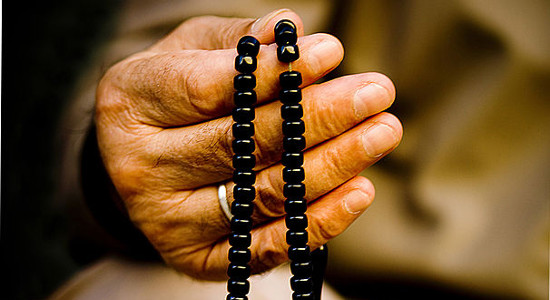
Image credit: Wikipedia
Ramadan ended. (May Allah accept all our prayer, fasting, du’a, and good deeds during this blessed month — ameen!) How should we, as Muslims, act now?
We graduated from the school of Ramadan; can life simply return to normal?
Our scholars mention a few points about this:
- Allah says, in surah Baqarah, that Ramadan was prescribed on us in the hope that we gain taqwa. Did we achieve that goal of the school of Ramadan? Or did we simply fast because of our parents, our friends, our spouse, or our culture?
- The continuation of our deeds shows the acceptance of our deeds (even if we continue them at a smaller scale than during Ramadan).
- We live life for a purpose, not haphazardly; just like we create dunya goals (get a degree, get a job, get a spouse, get a house, etc.) we must create deen goals, and work towards improving ourselves. Ramadan puts us through an obligatory one-month “boot camp” of self-improvement every year.
Did you pass the test of Ramadan? Did you benefit from Ramadan? The litmus test is: are you better after Ramadan than you were before Ramadan?
You can’t compare to yourself to in-Ramadan, because it’s not sustainable. At the same time, scholars say, if you live your life like you did in Ramadan, the Day of Repayment will be your Eid. That’s what this is all about. That is a goal worthy of setting.
Now, the game plan: the secret sauce of what to do after Ramadan comes from one key hadith of rasulullah (ﷺ):
أَخْبَرَنَا قُتَيْبَةُ، قَالَ حَدَّثَنَا اللَّيْثُ، عَنِ ابْنِ عَجْلاَنَ، عَنْ سَعِيدٍ الْمَقْبُرِيِّ، عَنْ أَبِي سَلَمَةَ، عَنْ عَائِشَةَ، قَالَتْ كَانَ لِرَسُولِ اللَّهِ صلى الله عليه وسلم حَصِيرَةٌ يَبْسُطُهَا بِالنَّهَارِ وَيَحْتَجِرُهَا بِاللَّيْلِ فَيُصَلِّي فِيهَا فَفَطِنَ لَهُ النَّاسُ فَصَلَّوْا بِصَلاَتِهِ وَبَيْنَهُ وَبَيْنَهُمُ الْحَصِيرَةُ فَقَالَ “ اكْلَفُوا مِنَ الْعَمَلِ مَا تُطِيقُونَ فَإِنَّ اللَّهَ عَزَّ وَجَلَّ لاَ يَمَلُّ حَتَّى تَمَلُّوا وَإِنَّ أَحَبَّ الأَعْمَالِ إِلَى اللَّهِ عَزَّ وَجَلَّ أَدْوَمُهُ وَإِنْ قَلَّ ” . ثُمَّ تَرَكَ مُصَلاَّهُ ذَلِكَ فَمَا عَادَ لَهُ حَتَّى قَبَضَهُ اللَّهُ عَزَّ وَجَلَّ وَكَانَ إِذَا عَمِلَ عَمَلاً أَثْبَتَهُ .
It was narrated that ‘Aishah said: “The Messenger of Allah (ﷺ) said: ‘Do as much of good deeds as you can, for Allah does not get tired (of giving reward) until you get tired. And the most beloved of deeds to Allah are those that are continuous, even if they are few.‘ Then he stopped that prayer and did not return to it until Allah took him (in death), and if he started to do something he would persist in it.” (Sunan An-Nasaai, 9⁄21)
(You can click the link to read the full English translation, instead of just this excerpt.)
In Ramadan, think about the actions we performed. We:
- Prayed a lot.
- Prayed in jama’ah/congregation
- Prayed Qiyaam Al-Layl
- Fasted. Every day.
- Gave charity. Lots of it.
- Reached out to our family.
We can continue all these deeds after Ramadan:
- Don’t pray 5x a day yet? Start. Improve yourself. Add just one prayer to what you pray now.
- Don’t pray qiyaam? Start. Pray two short rakahs right after Isha, and gradually make it longer and later and larger in quantity.
- Don’t fast any extra fasts? Start. Aim for three times a month (the White Days), or every Monday, or every Monday and Thursday.
- Don’t give sadaqah outside of Ramadan? Start. Give sadaqah, even if only a dollar once a week.
- Don’t have a good relationship with some of your relatives? Fix it. Talk to your family, especially distant relatives.
- Don’t read the Qur’an regularly? Start. Read something every day. Start with just one page a day, but read it with tafseer.
And a final warning: aim for slow, steady improvement over time. One trick Shaytaan capitalizes on is to encourage us to do everything and anything, all at once. Just like you can’t quit smoking today and run a marathon tomorrow, you can’t change full-force in a short amount of time.
Don’t even try. This may appear to work — for a day or two, or a week — until you burn out, and give up completely. Don’t fall for it. Start slow, and improve yourself until you become a much better person than you are.
May Allah allow us to seek the true, long-term benefits of Ramadan and better ourselves as people.
Source: Friday Khutbah at ISNA by shaykh Alaa Elsayed, August 7, 2015.